 WICHITA'S ECONOMY
WICHITA'S ECONOMY
NOTE: Except as noted, these comments are the opinions, perceptions or recollections of the author. No guarantee of accuracy is made; however a reasonable effort has been made to realistically reflect the author's life-long familiarity and involvement with the community.
NOTE: This page was originally written in 2015; it was partially updated in 2019.
Wichita's economy is a mix of many things -- manufacturing, home & building construction / maintenance, health and human services, hospitality, education, government, communications, fossil fuels and chemicals, and finance, to name a few. A mostly non-union state, Wichita has a few labor unions, chiefly in manufacturing.
 Aviation, in particular, is the major sector of Wichita's economy, and the city's fortunes largely rise and fall on that rather unpredictable "boom-and-bust" industry.
Aviation, in particular, is the major sector of Wichita's economy, and the city's fortunes largely rise and fall on that rather unpredictable "boom-and-bust" industry.
Commuting to work is seldom more than a 20-minute drive in rush-hour traffic, and often half that.
Taxes and regulation are lower here than in most other states, owing to Kansas' strong conservative history, and recent rise of Libertarians-turned-Republicans, who have largely taken over state and local government.

A high-tech manufacturing center, Wichita has profited from its many factories. Until recent years, Wichita has generally enjoyed higher-than-average incomes, and lower-than-average unemployment. According to a a Brookings Institute study, 77% of Wichita's manufacturing jobs are "high-tech" (65% "VERY-high-tech," though -- in that category -- Wichita wages are about 20%-25% lower than the national average for very-high-tech workers). Low-tech Wichita manufacturing workers have above-average incomes. And, overall, Wichita has traditionally been a successful manufacturing center.
However, recent circumstances have brought a change to that (click on the large graph below to pop up an enlargement):

-
Recession (a nationwide problem),
-
Increasing automation (epecially in factories) (a global problem)
-
Foreign competition (a global problem)
-
Boeing's pullout from Wichita (a union-contract-busting move, turning over its massive airliner subassembly factory to a subcontractor, to continue the same work without the high wages of their old union contract), and
- Political changes in state and local government...
-- with Wichita losing 28% of its manufacturing jobs between 2000 and 2010 (dropping from 29th in the nation, with about 75,000 manufacturing jobs, to only 38th in the nation, with 52,000 jobs, according to the Brookings Institute study).
In 2014, The Business Journals, a national internet blog —
affiliated with the nation's chain of local business journals (including the Wichita Business Journal) —
did
a study of business vitality in 101 U.S. cities, ranking Wichita 99th...
just two notches above dead last.
The annual ranking was based on:
- Concentration of small businesses;
- 1-year change in concentration of small businesses;
- 1-year change in total small businesses;
- 2-year change in population;
- 1-year change in private sector employment;
- 5-year change in private sector employment.
See:
"Wichita can do better on business vitality"
April 4, 2014, Wichita Business Journal
...or..the Google.com cache of that article
 The federal government's Bureau of Labor Statistics reported that
Wichita (Sedgwick County) wages lagged the region, and the nation, in the recovery. (See graph above.)
The federal government's Bureau of Labor Statistics reported that
Wichita (Sedgwick County) wages lagged the region, and the nation, in the recovery. (See graph above.)
But Wichita remains, as a whole, solvent and productive -- as of Spring, 2016 -- and is improving slowly.
UPDATE, early 2019:
With the election of President Donald Trump, and the implementation of the Republican Party's economic agenda (tax cuts and increased-deficit spending), the immediate economic fortune of the United States has improved -- at the cost of plunging the nation deeper and deeper into debt. Though lagging the nation, Wichita has benefitted signficantly.
However, most of the politicians who voted for the debt increase -- and many of the other adults who benefitted from the Republicans' short-term stimulus -- will be dead long before most of the debt repayment comes due. By "kicking the can down the road," the cost of adults' current prosperity is being shoved onto the backs of their children, grandchildren, and great-grandchildren, who will have to repay the foreign investors from whom the Republican party (with a largely cooperative Democratic Party) have borrowed, to, momentarily, artificially prop up and boost the U.S. economy.
Among the chief beneficiaries have been:
-
Wichita's Planemakers,
who specialize in providing luxurious transportation ("business" jets) for the rich, and jetliner fuselages to carry (mostly) the world's wealthy and upper-middle class. Massive Republican tax cuts for the nation's wealthy, and its corporations, have freed up money for such luxuries for the powerful and fortunate "1%".
-
Wichita's Oil Industry
Reductions in business regulation and environmental standards -- and the United States' reneging on global environmental agreements -- have also aided the Wichita region's oil industry (including Wichita's Koch Industries, master of the nation's oil pipelines).
-
Wichita's Medical Community
Fallout from anti-Medicaid policies of former Governor Brownback, and the Republican-controlled Kansas Legislature, continues to wither healthcare resources in rural Kansas. Consequently, Wichita's major hospitals have seen an increase in demand for their services -- largely coming from the healthcare-deprived regions of rural Kansas, where hospitals have been forced to close, and doctors have resigned or left for more profitable and attractive environments.
However, Trump's trade war with China has dampened the fortunes of Kansas' principal industry: Agriculture.
And Wichita, as one of the key centers of Kansas agribusiness, has suffered some in consequence -- though most of the suffering remains in rural areas, already hard-hit by years of increasingly severe weather (floods, drought, hailstorms, windstorms, and summer wildfires) as global warming continues, unabated.
For more info:
Following are some notable details about Wichita's economy...
WICHITA WORK:
Wichita has a strong work ethic, and most Wichitans hold fairly steady jobs. Until recently, Wichitans traditionally had lower unemployment than the nation at large, and slightly higher-than-average incomes (when adjusted for local cost-of-living).
Most Wichitans work in small or large factories (especially aviation-related), medical facilities, or retail and food service -- though many work in a wide range of other jobs. Many are white collar workers, but most are blue-collar workers, and many are menial-labor "gray collar" workers. (See DEMOGRAPHICS, on the PEOPLE page).
Wichita's primary income industries -- industries that bring money to Wichita -- are

- AIRCRAFT MANUFACTURING & SUPPORT
Wichita has traditionally been the world's highest-volume producer of aircraft, building most of the world's business jets (Cessna, Beech, Hawker and Learjet) and business turboprops (Beech King Airs), most U.S. military trainer planes, and many other aircraft -- plus providing engineering and parts for many other aircraft manufacturers, including Airbus and Boeing.
And, at Spirit Aerosystems (formerly Boeing-Wichita) Wichita builds most of the sections of the Boeing 737 -- the world's most popular jetliner -- before its shipment to Seattle for final assembly.
Bombardier operates its global flight test center here, testing not only locally built Learjets, but Canadian-built business jets, airliners and transports, as well.
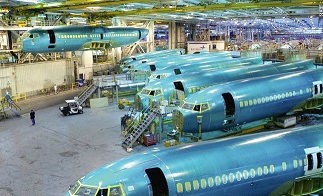 Subcontractors operate related foundries, machine shops, fabrication centers and other small factories throughout the area. Wichita is also home to several key aircraft-maintenance and aircraft-parts repair facilities.
Subcontractors operate related foundries, machine shops, fabrication centers and other small factories throughout the area. Wichita is also home to several key aircraft-maintenance and aircraft-parts repair facilities.
Wichita's innovative aviation industry is famed for cutting-edge designs, like America's first successful "commercial" airplane, historic racing planes, America's first successful business jet, the world's first certified all-carbon-fiber airplane, the world's first video-instrumented "glass-cockpit" planes, and the world's fastest civilian jet.
With multiple aircraft manufacturers, and their support enterprises and subcontractors,
aircraft, and their sub-assemblies and parts, make up most of Wichita's exports
(to the U.S., or to the world).
Half of Wichita's manufacturing workforce
is normally in aviation, and Wichita is
one of the nation's foremost employers of aerospace engineers
.
A major U.S. Air Force base (McConnell AFB), and over a dozen local airports, plus major aviation research and education facilities, and various other aviation enterprises and organizations, further expand Wichita-area aviation employment, and global reach.
Additional resources on Kansas and Wichita aviation industry include:
AIRCRAFT INDUSTRY IMPACT & ALTERNATIVES:
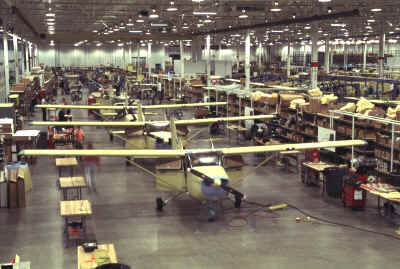 The high-profit aircraft industry has generally kept Wichita with above-average economic health, compared to other cities nationwide. At its peak, Wichita's aviation industry directly employed over 60,000 people. But the "boom-and-bust" cycles of the industry make Wichita's economy erratic — sometimes with sustained high unemployment for years.
Current aircraft industry employment is under 30,000 (as of 2015).
The high-profit aircraft industry has generally kept Wichita with above-average economic health, compared to other cities nationwide. At its peak, Wichita's aviation industry directly employed over 60,000 people. But the "boom-and-bust" cycles of the industry make Wichita's economy erratic — sometimes with sustained high unemployment for years.
Current aircraft industry employment is under 30,000 (as of 2015).
Wild swings of the industry, and its resulting workloads, result in workers being whip-sawed between exhausting mandatory overtime (often exceeding 60 hours a week) to sudden, complete unemployment -- tearing at their physical and mental health, families, and fortunes -- an impact constantly rippling throughout the community, often with devastating economic and social effect.
Since the 1970s, local leaders have tried (with varying levels of success) to diversify Wichita's economy away from its former near-total dependence on the aircraft industry. Both traditional and newer Wichita industries have served to stabilize Wichita's economy, including...
- FOOD & AGRICULTURAL PRODUCTS
 Wichita's first industry remains one of its most important. Wichita is a key center of the U.S. grain industry, and provides transportation, storage, processing and shipment of grain for much of the central U.S., supplying the world. Nearly a dozen giant grain elevators tower over Wichita's landscape, and the nation's largest private agri-business,
Cargill, has major flour-milling and soybean-processing factories here, along with the headquarters of their meat division
Wichita's first industry remains one of its most important. Wichita is a key center of the U.S. grain industry, and provides transportation, storage, processing and shipment of grain for much of the central U.S., supplying the world. Nearly a dozen giant grain elevators tower over Wichita's landscape, and the nation's largest private agri-business,
Cargill, has major flour-milling and soybean-processing factories here, along with the headquarters of their meat division
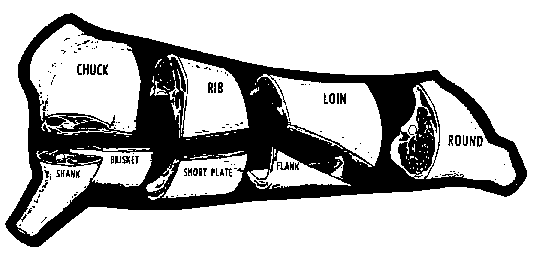 -- America's 3rd-largest beef producer. Meat packing has long been a major part of Wichita's industry.
-- America's 3rd-largest beef producer. Meat packing has long been a major part of Wichita's industry.
The food industry has the benefit of strong demand even in difficult economic times (one of the last things people cut from their budget).
Another Wichita-area agri-business is the ethanol industry -- with large Wichita-area companies developing or operating ethanol refineries nationwide.
- VEHICLE / HEAVY EQUIPMENT MANUFACTURING
 Wichita is the birthplace of Chance Manufacturing, famed for ferris wheels and carnival rides. Wichita has also built Chance's "trolley" buses, Cushman motor-scooters, and Big Dog motorcycles. (In the city's early history, it also produced early Jones automobiles and Burton railroad cars.)
Wichita is the birthplace of Chance Manufacturing, famed for ferris wheels and carnival rides. Wichita has also built Chance's "trolley" buses, Cushman motor-scooters, and Big Dog motorcycles. (In the city's early history, it also produced early Jones automobiles and Burton railroad cars.)
The invention of the popular "Ditch Witch" trenching machine
by Wichita's Davis Manufacturing led to its takeover by J.I. Case
(now "Case - New Holland," or simply "CNH"), who now uses the factory to produce their popular "skid steer loader"
 construction tractors, used by the hundreds of thousands worldwide.
construction tractors, used by the hundreds of thousands worldwide.
One notable shortcoming of Wichita's involvement with these industries has been their vulnerabililty to the erratic boom-and-bust cycles, similar to the aviation industry, that create havoc with workers and the community.
- APPLIANCE MANUFACTURING
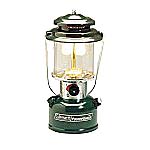 Birthplace of the Coleman Company, famed for lanterns and camping gear, Wichita has also produced Coleman furnaces and air conditioners. The Coleman furnace factory (now under Johnson Controls/York) manufactures a wide range of Heating, Ventilation & Air Conditioning (HVAC) systems -- from small home units to massive industrial systems, used nationwide. Independently, Coleman Outdoor Products still produces lanterns, cookstoves and other recreational equipment. Each company employs about 1,000 workers. Nationally popular Vornado fans -- uniquely aerodynamically efficient and powerful -- originated, here, too, as a by-product of Wichita's aircraft industry, and the brand later revived here.
Birthplace of the Coleman Company, famed for lanterns and camping gear, Wichita has also produced Coleman furnaces and air conditioners. The Coleman furnace factory (now under Johnson Controls/York) manufactures a wide range of Heating, Ventilation & Air Conditioning (HVAC) systems -- from small home units to massive industrial systems, used nationwide. Independently, Coleman Outdoor Products still produces lanterns, cookstoves and other recreational equipment. Each company employs about 1,000 workers. Nationally popular Vornado fans -- uniquely aerodynamically efficient and powerful -- originated, here, too, as a by-product of Wichita's aircraft industry, and the brand later revived here.
- HEALTHCARE
 Wichita is the regional healthcare center for most of Kansas, and north-central Oklahoma. The city is home to four regional hospitals -- ViaChristi St.Francis, ViaChristi St.Joseph, HCA/Wesley Medical Center and the Bob Dole VA Center -- and several specialty hospitals and clinics, nursing facilities, and independent medical, dental and optometric offices. In fact, the Via Christi health system (employing over 6,000 people at multiple local hospitals, clinics, rehab and research facilties) is commonly ranked as the 2nd or 3rd largest Wichita-area employer. Wichita-area colleges and universities train a large percentage of Kansas doctors, nurses and other heallthcare professionals. Like the food industry, the healthcare industry, has the benefit of strong demand even in difficult economic times (necessary healthcare is one of the last things people cut from their budget).
Wichita is the regional healthcare center for most of Kansas, and north-central Oklahoma. The city is home to four regional hospitals -- ViaChristi St.Francis, ViaChristi St.Joseph, HCA/Wesley Medical Center and the Bob Dole VA Center -- and several specialty hospitals and clinics, nursing facilities, and independent medical, dental and optometric offices. In fact, the Via Christi health system (employing over 6,000 people at multiple local hospitals, clinics, rehab and research facilties) is commonly ranked as the 2nd or 3rd largest Wichita-area employer. Wichita-area colleges and universities train a large percentage of Kansas doctors, nurses and other heallthcare professionals. Like the food industry, the healthcare industry, has the benefit of strong demand even in difficult economic times (necessary healthcare is one of the last things people cut from their budget).
- TRANSPORTATION
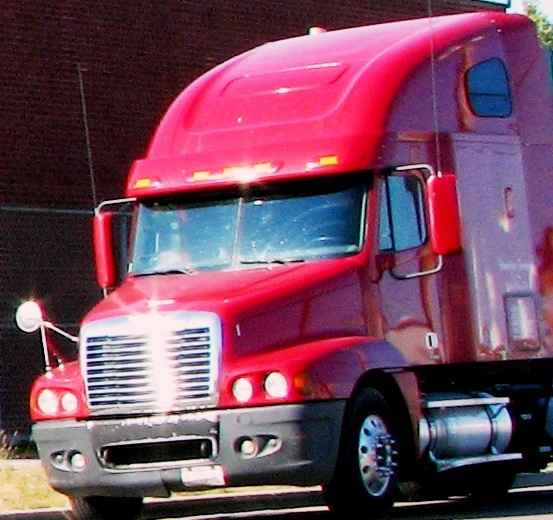
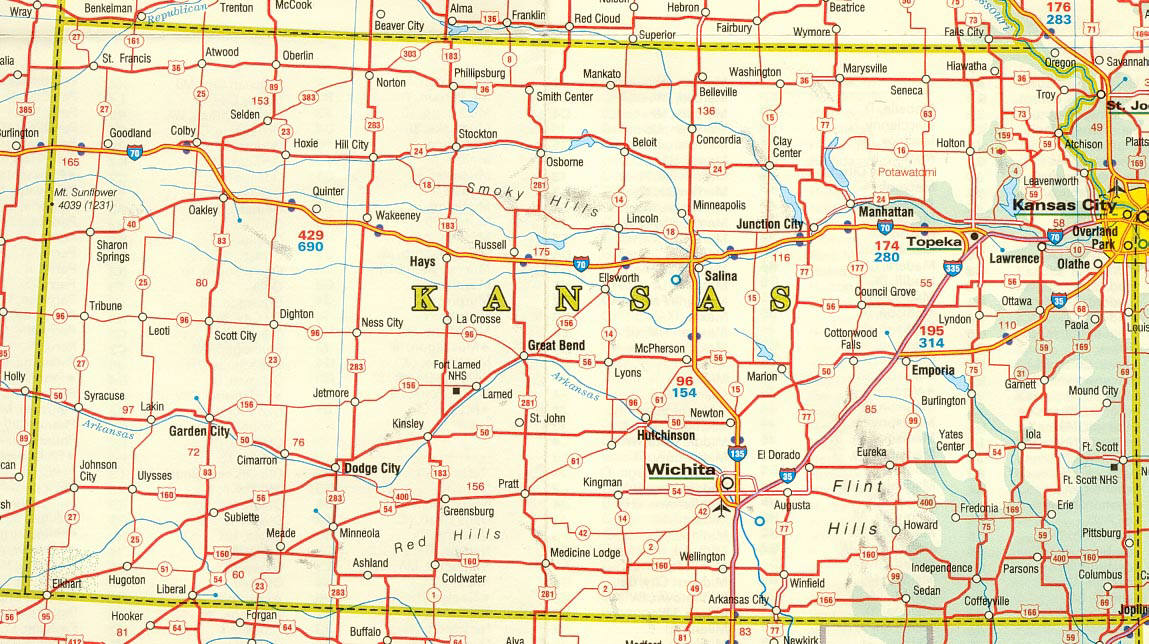 In addition to shipping grain and meat, and Wichita-manufactured goods, Wichita -- centrally-located in the U.S. -- provides extensive logistics (warehouse and distribution) operations, both regional and national.
In addition to shipping grain and meat, and Wichita-manufactured goods, Wichita -- centrally-located in the U.S. -- provides extensive logistics (warehouse and distribution) operations, both regional and national.
Wichita is an operations center for the several railroads that converge here, most with substantial rail yards. Wichita is a terminal or home base for regional and national trucking companies, and air freight operations.
 As the principal airline hub for southern, central and western Kansas, several airlines fly in and out of Wichita's Eisenhower Airport -- some offering
direct flights to major cities,
coast-to-coast, across the U.S. Multiple air cargo companies, and various charter-flying services operate in and out of Wichita, as well.
As the principal airline hub for southern, central and western Kansas, several airlines fly in and out of Wichita's Eisenhower Airport -- some offering
direct flights to major cities,
coast-to-coast, across the U.S. Multiple air cargo companies, and various charter-flying services operate in and out of Wichita, as well.
Various national and regional inter-city passenger bus services, and regional courier delivery services, have terminals or their home base in Wichita. Cross-country Amtrak passenger rail service is available in Newton, 30 miles north of the city; the Newton depot is linked with Wichita by inter-city bus service.
For more details, see the
TRANSPORTATION
section of this website.
- COMPUTER & COMMUNICATIONS SERVICES
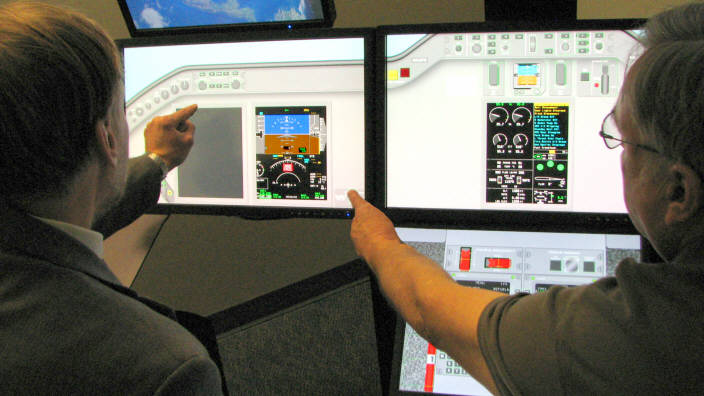 Wichita, because of its central location, has been home to several major facilities of telephone and computer industry giants -- including AT&T and T-Mobile -- and is a telemarketing hub for several major national companies operating large call centers here. Wichita is also home to several regional internet service providers and web developers. Specialty computer sofware firms also operate national facilities here, including NetApp and Wolters-Klewer/CCH, and software leaders in the hospitality industry.
Wichita, because of its central location, has been home to several major facilities of telephone and computer industry giants -- including AT&T and T-Mobile -- and is a telemarketing hub for several major national companies operating large call centers here. Wichita is also home to several regional internet service providers and web developers. Specialty computer sofware firms also operate national facilities here, including NetApp and Wolters-Klewer/CCH, and software leaders in the hospitality industry.
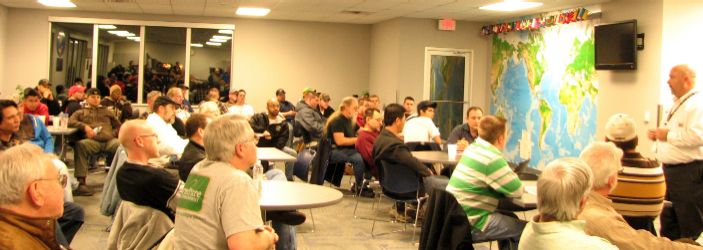
- EDUCATION
Wichita is home to a wide variety of colleges and universities, and vocational training facilities -- training over 15,000 adults annually, from around the state, the nation and the world. See the EDUCATION section, on the LIVING in WICHITA page.
- FOSSIL FUEL MANAGEMENT
 Wichita is home to dozens of small oil-exploration companies and support enterprises, and operations of two major pipeline companies. Koch Industries -- America's largest privately-held company -- operates its massive world headquarters here... managing refineries, pipelines, storage and shipping terminals worldwide.
Wichita is home to dozens of small oil-exploration companies and support enterprises, and operations of two major pipeline companies. Koch Industries -- America's largest privately-held company -- operates its massive world headquarters here... managing refineries, pipelines, storage and shipping terminals worldwide.
- RETAIL & WHOLESALE
 Wichita is the regional shopping hub for most of Kansas, both for businesses and individuals, as well as providing wholesale distribution to the state's retailers. The area includes four regional shopping centers and the state's widest variety of specialty retailers -- from jewelry, books, bridal wear, electronics and guns, to cars, trucks, boats and aircraft.
Wichita is the regional shopping hub for most of Kansas, both for businesses and individuals, as well as providing wholesale distribution to the state's retailers. The area includes four regional shopping centers and the state's widest variety of specialty retailers -- from jewelry, books, bridal wear, electronics and guns, to cars, trucks, boats and aircraft.
Wholesalers and distribution warehouses supply grocery stores, discount houses, department stores, medical facilitites, small industries, construction contractors and tradesmen, and fuel suppliers -- throughout the state, and even into neighboring regions. Some Wichita retailers and wholesalers serve a national or even international clientele.
Wichita is the community that made the controversial "rent-to-own" marketing scheme (chiefly for furniture and appliances) a national phenomenon, with its pioneering Basham Rentals, ABC Rentals and industry-leader Rent A Center.
- FINANCE & INSURANCE
 Wichita is the regional hub for banking for South-Central Kansas, and his home to Intrust Bank, one of the very largest Kansas-owned banks. Additionally, Wichita has major branches of other regional banks, notably Fidelity Bank and Commerce Bank, and has a large branch of the Bank of America. Several other smaller local or regional banks have operations here, as do several savings & loan institutions, credit unions, and mortgage finance companies. Wichita is also home to the regional headquarters of the federal Farm Credit Bank, supporting farms throughout the Midwest. Wichita is also home to several local investment and insurance brokerages, serving the South-Central Kansas area.
Wichita is the regional hub for banking for South-Central Kansas, and his home to Intrust Bank, one of the very largest Kansas-owned banks. Additionally, Wichita has major branches of other regional banks, notably Fidelity Bank and Commerce Bank, and has a large branch of the Bank of America. Several other smaller local or regional banks have operations here, as do several savings & loan institutions, credit unions, and mortgage finance companies. Wichita is also home to the regional headquarters of the federal Farm Credit Bank, supporting farms throughout the Midwest. Wichita is also home to several local investment and insurance brokerages, serving the South-Central Kansas area.
- HOSPITALITY

ENTERTAINMENT, FOOD & LODGING)
The Wichita area is the regional entertainment and cultural hub for most of Kansas (See AESTHETICS, ARTS & CULTURE section, on this page, below), location of the state's largest concert, convention and exhibition facilities, a wide range of sporting events, festivals, and night life venues.
 Wichita also provides lodging and food for those visiting here for shopping, education or healthcare.
Wichita also provides lodging and food for those visiting here for shopping, education or healthcare.
Wichita is the birthplace of America's fast-food industry: The first "hamburger chain" -- White Castle -- originated here, as did  the first pizza chain, Pizza Hut. Wichitan Jack deBoer developed the nation's first successful chain of long-stay motels (Residence Inns), and the next two such chains, as well (Southhampton Inns & Candlewood Inns). However, all of these companies have been acquired by out-of-state corporations, and moved elsewhere.
the first pizza chain, Pizza Hut. Wichitan Jack deBoer developed the nation's first successful chain of long-stay motels (Residence Inns), and the next two such chains, as well (Southhampton Inns & Candlewood Inns). However, all of these companies have been acquired by out-of-state corporations, and moved elsewhere.
As hinted above, under "COMPUTERS & COMMUNICATIONS," the hospitality industry (notably Best Western Motels and Royal Carribbean Cruise Lines) operate some major reservation call-centers in Wichita. And key software for the lodging industry is developed and supported here.
These are the dominant productivity/export sources of Wichita's income, but Wichita-area workers provide a much broader range of goods and services than listed here -- including factories producing everything from nuts and bolts, to giant canvas tents, to industrial electronics, to ornamental decals, to helicopter and spacecraft parts -- for regional, national and global markets.
And Wichita is Kansas' main source of technical and administrative expertise, and leadership, for a wide range of business and human needs, all across the state.
EXTRA INFORMATION:
- Businesss Organizations in
Wichita & South-Central Kansas
- Wichita, KS Metro Area Manufacturing Statistics
Brookings Institute, from its Locating American Manufacturing data survey, and its May 2012 report: Locating American Manufacturing: Trends in the Geography of Production
-
Wichita - South Central Kansas
Regional Export Plan
An analysis of the region's economy,
and a plan for revitalizing its exports.
2013, Brookings Institute.
with the South-Central Kansas
Regional Export Planning Team (REPT).
(a consortium of Kansas & local government,
colleges and business organizations)
- Wichita - The Air Capital of the World - Powerpoint slideshow PDF
Presentation of the City of Wichita, for China,
2013 China in General Aviation Conference (CIGAC)
NOTE: This slide-show is a useful basic overview of Wichita, and its manufacturing base. It includes some unexpected data including the "population" of "600,000" -- which actually refers to the Wichita MSA (Metropolitan Statistical Area), covering three counties.
These slides were made to charm Chinese business and government representatives in 2013, in an optimistic effort, led by then-Mayor Carl Brewer, to "partner" with China in the general aviation industry. Critics note that China's partnerships with the U.S. aviation industry amount to "job-robbing" from Americans, and -- in the long run -- accomplish nothing more than building the Chinese aerospace industry, and military capability, to compete with the U.S. Local critics complain that the mayor's effort was, at best, a misguided effort at Wichita economic development, or, at worst, a self-serving exhibition junket for city officials, only inspiring Chinese competition.
-
WICHITA - Clusters of Innovation Study
2000 - Harvard Business School (hbs.edu), Harvard Univ.
Around 2000, the Harvard Business School did a study of "clusters of innovation" in several of America's key industrial cities. Among those selected for the study was Wichita, chiefly due to its pre-eminince in the aviation industry. This study outlines and analyzes several distinguishing characteristics of Wichita and its industry.
"The Wichita Files: There are good reasons why they build airplanes here."
Apr 1, 2011,
by George C. Larson Business & Commercial Aviation, and Aviation Week Intelligence Network (AWIN)
A detailed, lengthy review of Wichita's aviation industry and culture, by a leading aerospace industry journalist, with extensive remarks from numerous Wichita-area industry leaders. Written in 2011, before Hawker-Beechcraft was absorbed by Cessna parent, Textron. A realistic, detailed portrait of Wichita's aviation industry, and its environment, and the community's relations with that industry.
-
"FocusForward" Study & Analysis of Wichita
(Links below)
2015-2016 - Wichita Community Foundation
The WCF "FocusForward" study & analysis -- a 2015-2016 study of Wichita economics by Harvard economist (and childhood Wichitan) James Chung -- provides noteworthy comparisons of Wichita's economy to several midwestern and industrial communities largely comparable to Wichita.
However, it overlooks the impact of government agricultural subsidies -- particularly the federal corn/ethanol subsidy -- on many of those communities (particularly cities in Iowa, especially Cedar Rapids and Des Moines, heavily cited as "superior" economic performers). In fact, those communities are extraordinary major beneficiaries of federal corn/ethanol subsides (and related commerce), radically influencing and distorting their economies away from normal economic responses to normal economic forces. This was not reported in Chung's initial presentations.
Doing Business with City & County
Government
Wichita Business Journal, 1984
|
|